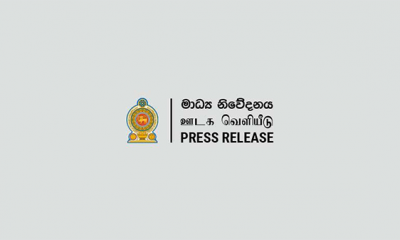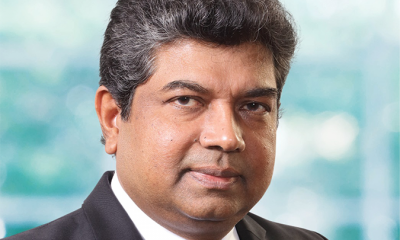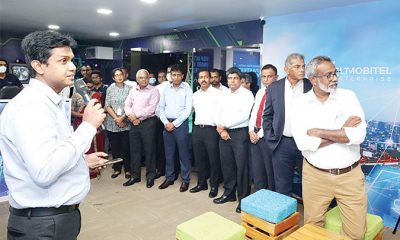Business
SLT Group posts 3Q 2023 results with moderate growth
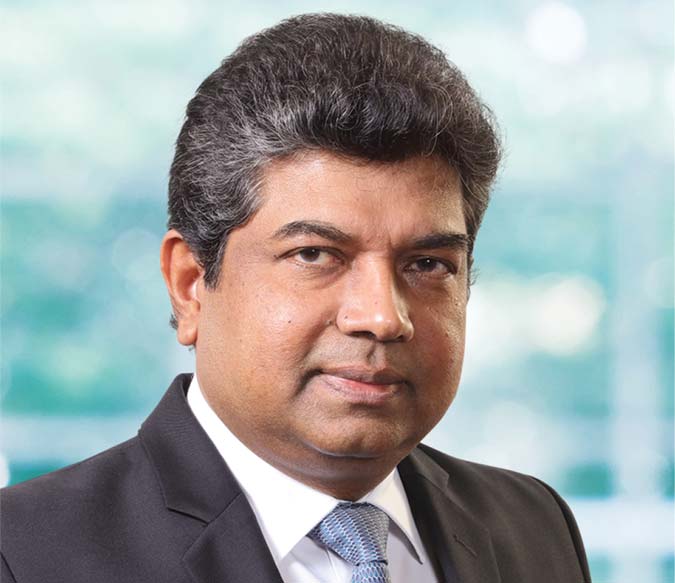
The SLT Group released its financial results for the third quarter ending September 30, 2023, presenting moderate growth. SLT PLC reported a revenue of LKR 17,490 Mn with a growth of 3.7%, while Mobitel recorded 2.7% de-growth during Q3’23 compared to Q3’22.
The Group’s consolidated revenue for the quarter increased by 3.9% to LKR 27.7 Bn, compared to LKR 26.7 Bn in Q3 2022. SLT PLC revenue growth was driven mainly by growth in broadband, PEOTV and enterprise revenue streams. During the 3rd quarter, Mobitel regained its growth after several quarters of decline and revenue has begun to increase in Q3 with a 3% growth over Q2.
Compared to Q3 2022, SLT Group’s operational expenditure (Opex) increased by 13.3% in Q3 2023 to LKR 19.7 Bn. Major causes of SLT’s rising Opex are increased costs related to electricity, repair and maintenance. Despite the growth in revenue that was recorded, SLT was unable to match the increase in costs which has impacted SLT’s profitability.
For the 9 months ending September 2023, SLT Group’s Opex was LKR 57 Bn, a 14.9% increase from LKR 49.6 Bn in the same period last year. Cost surges are attributed to economic conditions such as higher electricity tariffs, LKR devaluation against USD, and import restrictions.
The SLT Group’s financial performance in Q3’23 was significantly impacted by a steep decline in profitability of its subsidiary, Mobitel. Group EBITDA decreased by 13.7% compared to the corresponding quarter in previous year, primarily due to decrease in Mobitel EBITDA. The drop in revenue and increase in Opex, have led the Mobitel EBITDA to decrease during Q3’23. Accordingly, Group Operating Profit also dropped by 81% during the quarter. Group PAT decreased by 208% mainly due to Operating loss in Mobitel as well as increase in finance cost of SLT PLC.
However, Mobitel profitability has improved notably in Q3’23 compared to Q2’23 as Mobitel records an increase in EBITDA by 36%, EBIT by 93% and NPAT by 44% due to the growth in revenue and optimization of business parameters. Tighter cost controls and revenue growth initiatives at Mobitel, along with lower finance costs, will be critical to restoring the Group’s profit trajectory going forward.
Janaka R. Abeysinghe, CEO of Sri Lanka Telecom said, “The third quarter of 2023 continued to be challenging for SLT Group due to the ‘country’s economic conditions.
However, through concerted efforts to optimise operations and carefully managed costs, SLT and Mobitel have been able to arrest further deterioration of the situation compared to the previous quarters, which appears to be stabilizing. Our persistent focus on delivering high-quality telecommunication services and arresting the high churn seen earlier has provided positive results. As a Group, we remain fully committed to overcoming the current challenges and providing seamless connectivity to all Sri Lankans.”
Business
Dialog delivers strong growth, stronger national contribution in FY 2025
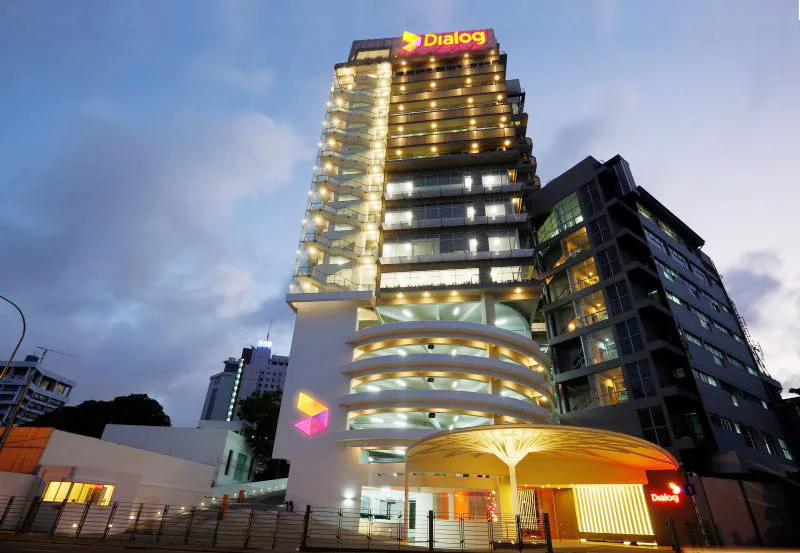
Dialog Axiata PLC announced, Friday 6th February 2026, its consolidated financial results (Reviewed) for the year ended 31st December 2025. Financial results included those of Dialog Axiata PLC (the “Company”) and of the Dialog Axiata Group (the “Group”).
Group Performance
The Group delivered a strong performance across Mobile, Fixed Line and Digital Pay Television businesses recording a positive Core Revenue growth of 16% Year to Date (“YTD”). Group Headline Revenue reached Rs179.6Bn, up 5% YTD, despite the continued strategic scaling down of low-margin international wholesale business. In Q4 2025, Revenue was recorded at Rs46.5Bn up 2% Quarter-on-Quarter (“QoQ”) and 2% Year-on-Year (“YoY”).
The Group Earnings Before Interest, Tax, Depreciation and Amortisation (“EBITDA”) reached Rs86.0Bn up 30% YTD supported by Core Revenue performance and Cost Rescaling Initiatives. On a QoQ basis Group EBITDA demonstrated a modest growth to record at Rs23.0Bn up 2% QoQ with an EBITDA margin of 49.5% in line with the Revenue performance. Group EBITDA margin reached 47.9% for FY 2025, up 9.2pp.
Group Net Profit After Tax (“NPAT”) reached Rs20.8Bn for FY 2025, up 67% YTD mainly resulting from robust EBITDA growth, despite higher tax and net finance costs. Normalized for forex impact, NPAT growth was recorded at +>100% YTD to reach Rs22.1Bn. On a QoQ basis NPAT grew 3% to reach Rs5.9Bn resulting from strong EBITDA performance.
On the back of strong operational performance, the Group recorded Operating Free Cash Flow (“OFCF”)
of Rs49.3Bn for FY 2025 up >100% YTD.
Dividend Payment to Shareholders
In line with the dividend policy and financial performance of the Group and taking into account the forward investment requirements to serve the nation’s demand for Broadband and Digital services, the Board of Directors of Dialog Axiata PLC at its meeting held on 6th February 2026, resolved to propose for consideration by the Shareholders of the Company, a dividend to ordinary shareholders amounting to Rs1.50 per share. The said dividend, if approved by shareholders, would translate to a Dividend Yield of 5.0% based on share closing price for FY 2025. The dividend so proposed will be considered for approval by the shareholders at the Annual General Meeting (AGM) of the Company, the date pertaining to which would be notified in due course.
Company and Subsidiary Performance
At an entity level, Dialog Axiata PLC (the “Company”) continued to be the primary contributor to Group Revenue (76%) and Group EBITDA (74%). Aided by sustained growth in the Data segment and cost-rescaling initiatives, Company revenue was recorded at Rs135.8Bn for FY 2025, up 18% YTD, EBITDA rose 32% YTD to reach Rs63.6Bn. On a QoQ basis, Q4 2025 Revenue was recorded at Rs34.8Bn, down 1% QoQ due to a reclassification of Hubbing Revenue, while EBITDA decline 1% QoQ to record Rs17.0Bn, largely attributable to network restoration costs and donations made in relation to the Cyclone Ditwah relief efforts. Furthermore, NPAT was recorded at Rs15.6Bn for FY 2025, up 41% YTD. Normalised for forex impacts, the company NPAT was up +>100% YTD to reach Rs17.0Bn. On a QoQ basis, Company NPAT was recorded at Rs4.5Bn, down 6% QoQ.
Business
Ceylinco Life’s Pranama Scholarships reach 25-year milestone
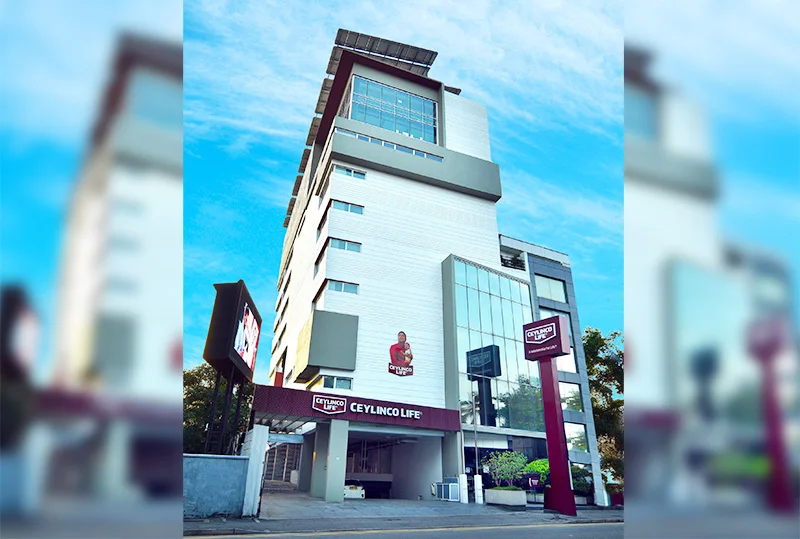
Ceylinco Life has announced the launch of the 25th consecutive edition of its flagship Pranama Scholarships programme, marking a significant milestone in the company’s long-standing commitment to recognising and rewarding excellence among the children of its policyholders.
Under the 2026 programme, the life insurance market leader will present scholarships with a total cumulative value of Rs. 22.7 million, continuing a rewards initiative that has now been conducted without interruption for a quarter of a century. Since its inception, the Ceylinco Life Pranama Scholarships programme has benefitted 3,466 students across the country, representing a total investment of Rs. 240 million in nurturing academic achievement and outstanding performance in sports, arts and other extracurricular pursuits.
Business
Sri Lankans’ artistic genius glowingly manifests at Kala Pola ‘26

The artistic genius of Sri Lankans was amply manifest all over again at ‘Kala Pola ‘26’ which was held on February 8th at Ananda Coomaraswamy Mawatha Colombo 7; the usual, teeming and colourful venue for this annual grand exhibition and celebration of the work of local visual artists.
If there is one thing that has flourished memorably and resplendently in Sri Lanka over the centuries it is the artistic capability or genius of its people. It is something that all Sri Lankans could feel a sense of elation over because from the viewpoint of the arts, Sri Lanka is second to no other nation. With regard to the visual arts a veritable dazzling radiance of this inborn and persisting capability is seen at the annual open air ‘Kala Pola’.
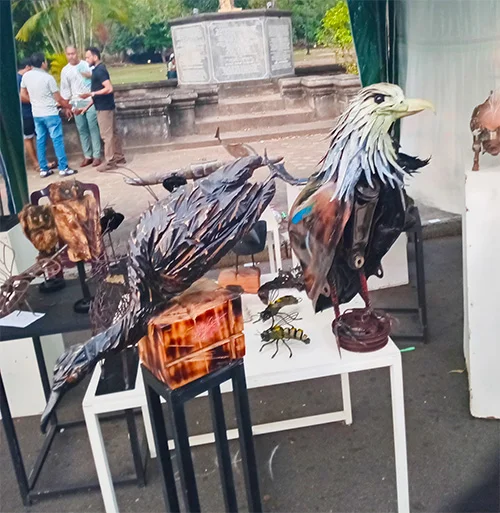
A bird of Sri Lanka created from scraps of iron waste.
All capable visual artists, wherever they hail from in Sri Lanka, enjoy the opportunity of exhibiting their work at the ‘Kala Pola’ and this is a distinctive ‘positive’ of this annual event that draws numberless artists and viewers. There was an abundance of paintings, sketches and sculptures, for instance, and one work was as good as the other. Ample and equal space was afforded each artist. Its widely participatory and open nature enables one to describe the exhibition as exuding a profoundly democratic ethos.
Accordingly, this time around at ‘Kala Pola ‘26’ too Sri Lankans’ creative efforts were there to be viewed, studied and enjoyed in the customary carnival atmosphere where connoisseurs, local and foreign, met in a sprit of camaraderie and good cheer. Many thanks are owed once again to the George Keyt Foundation for the presentation of the event in association with the John Keells Group and the John Keells Foundation, not forgetting the Nations Trust Bank, which was the event’s Official Banking Partner. The exhibition was officially declared open by Chief Guest Marc-Andre Franche, UN Resident Coordinator in Sri Lanka.
By Lynn Ockersz
-

 Features3 days ago
Features3 days agoMy experience in turning around the Merchant Bank of Sri Lanka (MBSL) – Episode 3
-

 Business4 days ago
Business4 days agoZone24x7 enters 2026 with strong momentum, reinforcing its role as an enterprise AI and automation partner
-

 Business3 days ago
Business3 days agoRemotely conducted Business Forum in Paris attracts reputed French companies
-

 Business3 days ago
Business3 days agoFour runs, a thousand dreams: How a small-town school bowled its way into the record books
-

 Business3 days ago
Business3 days agoComBank and Hayleys Mobility redefine sustainable mobility with flexible leasing solutions
-

 Business4 days ago
Business4 days agoHNB recognized among Top 10 Best Employers of 2025 at the EFC National Best Employer Awards
-

 Business4 days ago
Business4 days agoGREAT 2025–2030: Sri Lanka’s Green ambition meets a grid reality check
-

 Editorial6 days ago
Editorial6 days agoAll’s not well that ends well?


